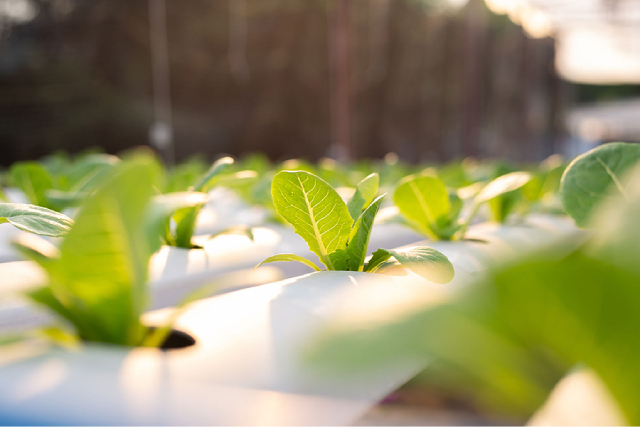
27 Mar The Impact of Hydroponic Farming on the Environment
Hydroponic farming, a soilless method of cultivating plants, is gaining momentum as a sustainable agricultural practice. As the world grapples with issues like climate change, soil degradation, and water scarcity, hydroponics offers a promising solution with the potential to mitigate environmental impact.
In this article, we delve into the various ways hydroponic farming impacts the environment and how it stands as a beacon of sustainable agriculture.
Water Conservation
Traditional agriculture consumes vast amounts of water, often leading to depletion of freshwater sources and environmental degradation.
Hydroponic farming, however, utilises water more efficiently by recycling it within closed-loop systems. Unlike conventional farming, which loses water through evaporation and runoff, hydroponic systems recirculate water, minimising waste and reducing overall water consumption. In fact, research suggests that hydroponic farming can use up to 90% less water than traditional soil-based agriculture, making it a crucial tool in water conservation efforts.
Consumer Health and Safety
Conventional farming relies heavily on chemical fertilisers and pesticides to combat pests and promote plant growth. However, these chemicals often leach into the soil and waterways, causing pollution and harming insects, birds, and aquatic animals.
Hydroponic farming significantly eliminates the need for chemical fertilizers and pesticides by providing plants with precisely-measured nutrients through water solutions. Moreover, the controlled environment of hydroponic systems minimises the risk of pest infestations, further decreasing reliance on harmful pesticides.
With growing concerns about pesticide residues and foodborne illnesses, hydroponically grown produce offers a safe and healthy alternative. By eliminating the need for chemical pesticides and fungicides, these crops are not only safer for consumers but also free from harmful residues. This has led to a growing demand for hydroponically grown fruits and vegetables in the market.
Soil Preservation
One of the most significant advantages of hydroponic farming is its ability to eliminate the need for arable land.
In traditional agriculture, intensive farming practices lead to soil erosion, degradation, and loss of fertility. This degradation not only affects agricultural productivity but also contributes to habitat destruction and desertification.
Hydroponic systems, operating without soil, bypass these challenges entirely, enabling cultivation in urban areas, deserts, and regions with poor soil quality. By preserving soil resources, hydroponic farming helps protect vital ecosystems and promotes land conservation efforts.
Localised Production and Food Security
Hydroponic farming offers the potential for localised food production, reducing the carbon footprint associated with transporting goods over long distances. By cultivating crops closer to urban centres and consumer markets, hydroponic farms can significantly decrease the environmental impact of food distribution.
Moreover, hydroponics enables year-round cultivation, irrespective of seasonal variations or climatic conditions, enhancing food security and resilience to climate change-induced disruptions. By promoting local food systems, hydroponic farming strengthens community resilience and reduces reliance on global supply chains.
Conclusion
As the world faces mounting environmental challenges, the adoption of sustainable agricultural practices becomes imperative. Hydroponic farming emerges as a promising solution, offering numerous environmental benefits ranging from water conservation and reduced chemical usage to soil preservation and energy efficiency. By harnessing the power of technology and innovation, hydroponic agriculture paves the way for a more sustainable and resilient food system. As we strive to build a greener future, hydroponics stands as a beacon of hope, demonstrating the transformative potential of sustainable farming practices.
If you’re planning to adopt hydroponics, browse our wide selection of VPONIC™ Hydro-Agriculture solutions. As a PVC pipe supplier in Singapore, we also offer a comprehensive range of piping materials, including the SS141 uPVC pipes and fittings. Do reach out to us if you’re interested in purchasing quality PVC pipes and pipe fittings.
